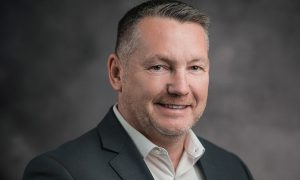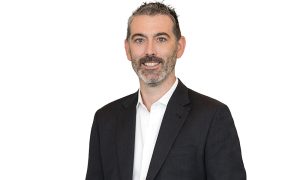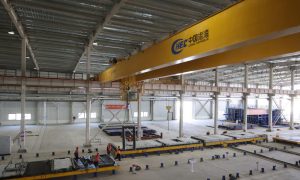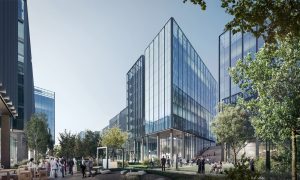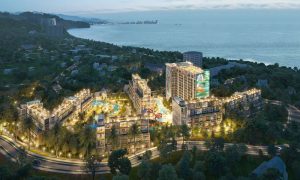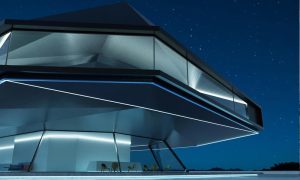Off-site construction a quick fix for India hospital project
How modular units and pod manufacturing are being used for the PMHP Hospital in Calicut

Two years ago, KEF Holdings, a UAE-based multinational holding company that specialises in off-site construction technology, announced the launch of its Indian operations with investments worth more than $245 million.
These investments would be channelled through two business verticals – KEF Health and KEF Infra – the company said at the time. These two subsidiaries would also be the launch pad for a project close to the heart of KEF Holdings founder-chairman Faizal E Kottikollon.
The PMHP (Premium Medical Healthcare Providers) Hospital is a 500-bed, $8.1 million facility being built in two phases in Calicut, Kerela, Kottikollon’s hometown. Designed as a pilot project for KEF Health, the tertiary care hospital will provide cardiology, orthopaedics and neuroscience facilities to the population of Calicut.
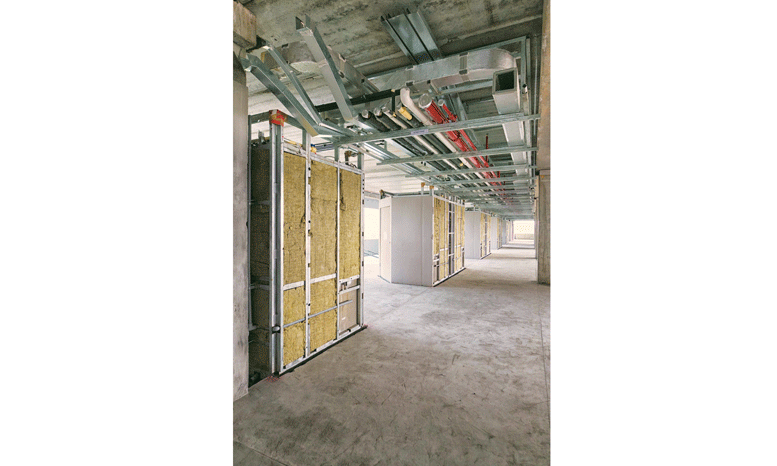
Built in a joint venture with the PeeKay Group and Dr Ali Faizal, one of India’s leading cardiologists, the MEITRA hospital also includes input and collaboration from specialist doctors from Cleveland Clinic and TAHPI, an Australian international specialist in health facility planning and design.
Scheduled to open its doors to the public by December 1, the project is rapidly moving to completion thanks to the planning and technology of KEF Holding and its subsidiaries. Constructed entirely using off-site construction technology, the hospital infrastructure has been built in a record time of 18 months, almost 50% faster than if built using conventional construction methods, KEF says.
Speaking in June 2016, Faizal Kottikollan says healthcare infrastructure is a key focus area for KEF Holdings and that the MEITRA hospital is the result of a combination of the company’s expertise in off-site construction and the local experience and expertise of the Peekay Group.
“Healthcare infrastructure is a key focus area for us, because one of our core philosophies as an organisation is that every individual – including the underserved and especially vulnerable in our society – has the right to access quality, affordable healthcare.
“We believe that combining modular construction methodologies with cutting-edge disruptive healthcare technologies can revolutionise the healthcare industry. MEITRA will bring a paradigm shift to healthcare by significantly improving clinical outcomes and enhancing the patient experience,” he says.
In order to gain a better understanding of what delivering a healthcare facility of this type entails, Big Project ME spoke to Sumesh Sachar, CEO of KEF Infrastructure and the man tasked with overseeing the delivery of this flagship project.
“For us, the hospital represents the best value proposition for the solutions we provide at KEF Infrastructure. At our 42-acre manufacturing site in Krishnagiri, Tamil Nadu, we have a world-class high-end technology precast facility. We have world-class joinery, we have modular MEP units and a pod manufacturing facility as well, which produces bathroom and prefabricated rooms. In addition, we also have an aluminium glazing facility.”
Covering a total area of 27,870sqm, the hospital is equipped with modular MEP, ready-to-use plug-and-play bathroom pods, medical headboards and best-in-class medical technologies. Every building element in the hospital, from rooms to operating theatres, was built off-site at the KEF Infra One Industrial Park, then transported and assembled on-site.
“We’re scheduled to open later this year [December 1] and I would say that the state of the project is that the entire structure is complete, we finished it in just under four months,” says Sachar. “It was delivered from our factory, with some project specifics, such as the super-high columns, precast at our factory. Our entire external façade was also done in precast, with graphic concrete panels that really showcase the beauty of concrete.
“We’ve completed up to the fourth floor, it’s G+7, so we have a total of four floors completed, including a beautiful mock-up room. I would like to say that 80% to 85% of it is all from the KEF manufacturing plant. Some of the products that have come from our manufacturing facility so far – other than the structure, of course – is our modular MEP, we did a bathroom pod here as well, so there’s a total of 89 bathroom pods that we delivered. These pods are double bathroom pods, so it’s two pods in one, so to speak.
“We’ve been able to do the mock-up of the pod here in the facility, get it tested and also done the modular testing here. All of it is tested in our facility and shipped to site.”
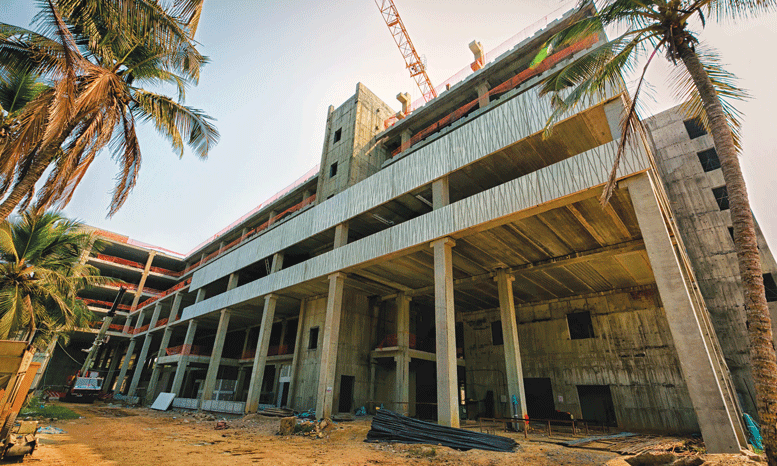
Given India’s reputation for lackadaisical time-keeping and organisation, we wonder whether Sumesh Sachar’s team faced any logistical challenges when delivering the units to site. However, he insists that perceptions are flawed, at least in KEF Infra’s case, as they’ve worked out a system to ensure that delivery and installation continue on schedule.
“Logistics from our manufacturing plant to within a 700km radius poses no real logistical problems. Once we start going beyond that radius, we have to start looking at the cost benefit analysis for most of our customers.
“So PMHP doesn’t really pose any significant challenges, we’ve been able to deliver most, if not all elements with any issues because the design and planning we’ve done allows for that. We’ve also got tower cranes on-site to help with installation. All the other items are shipped in on flatbed trailers.”
With the first phase of the project scheduled to deliver 205 beds by the end of the year, MEITRA is looking to tap into Kerala’s growing medical tourism market. It says it will offer “first-class healthcare services, complemented by a hospitality ambience and elevated patient care”, which will ultimately make a positive contribution to the state’s economy.
Sachar says the project team is very conscious of the high standards that need to be maintained, explaining that building off-site ensured that they were able to control the quality and consistency of the elements installed.
“We were very particular in making sure that we had a very strong design team to predict whatever the needs of the hospital were. TAPHI brought a lot of value to the table in terms of specifications, and we worked in accordance with those specifications.
“The beauty of it was that we were able to control the production of a pre-fabricated bathroom, for instance, in a factory setting. Once it’s produced and the mock-up is signed off by the customer, it’s a standardised process and that offers us the advantage of consistency in terms of quality and time,” he asserts.
“One of the challenges here in India is that the consistency and quality is varied. You can walk into one prefabricated bathroom and you’ll see mirrors, for example, placed differently compared to other bathrooms. It’s a myopic example, but you know, there are all these different complications. For us, we take it down to millimetres in terms of variation.”
Finally, Sachar points out that the construction of the hospital has had some additional benefits, not just to KEF Holdings and its partners and subsidiaries, but to the wider community as well. While they have used off-site technology to manufacture the elements of the project, the project has been able to attract and train a wide variety of talent from India and even the UAE, he says.
“We’ve been blessed that what we’re doing here is something very exciting, so we’ve been able to attract talent from all over the world, particularly from the UAE. We’ve got a team of installers that have experience in installing structures on the Palm, installing hospital structures in the UAE, so we’ve got a lot of skilled people.
“What we do then is that we train our Indian talent, and part of the beauty of this solution is that we invigorate young talent in our country. We pick anywhere between 100 to 150 graduates from all the different engineering fields, and we’ve got a team from the UAE that are Indians coming back, and they will train the local talent and get them to grow and develop their skills,” he concludes.
PROJECT STATS
Project name: MEITRA Hospital
Project location: Calicut, Kerala, India
Total project area: 27,870sqm
Project budget: $8.1 million
Hospital size: 500 beds (205 to be delivered in Phase I)
Scheduled completion: December 1, 2016

